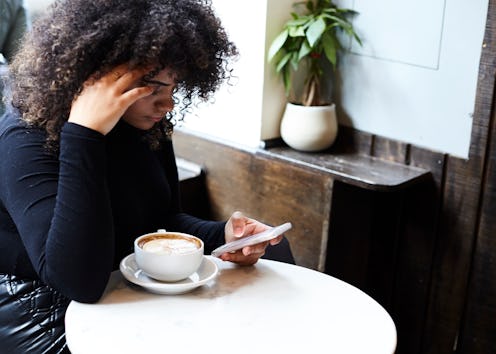Life
A New Study Reveals The Personality Trait Combinations That May Lead To Social Anxiety

For people with social anxiety, just the mere thought of walking into a room full of strangers can be debilitating. "Social anxiety is the fear of being judged and evaluated negatively by other people, leading to feelings of inadequacy, inferiority, self-consciousness, embarrassment, humiliation, and depression," the Social Anxiety Institute explained. Now, a new study has revealed that some personality types may be more likely to experience social anxiety.
Published in The Journal of Psychology, the study explored the Big Five personality traits — extraversion, agreeableness, openness, conscientiousness, and neuroticism — to see how they influenced social anxiety. People with certain traits paired together were found to experience lower levels of social anxiety. For instance, participants who were highly open and extroverted had a significantly lower level of social anxiety. "Extraverts are likely to be protected against social anxiety symptoms, but more so the more open they are," the study's abstract noted.
According to the personality test website 123 test, people who have a high level of openness enjoy learning new things and having new experiences, and people who are extraverts get their energy from interacting with other. Therefore, it makes sense that someone with this personality combination is less likely to be socially anxious.
On the other hand, people who were less open, but who were also highly agreeable, were more likely to experience social anxiety. Highly agreeable people tend to be friendly, cooperative, and empathetic. But pair this with a dislike of being thrust into new experiences, and you've got someone who feels the need to go with the flow, is absorbing the energy of everyone around them, and is hating every second of it. No doubt, this can make a person feel super bajiggity — and it's a recipe for social anxiety, the study found.
This is me all day. While I enjoy some new experiences, I don't like surprises. I want to know everything that's going to happen and who's going to be there. Being in unfamiliar social situations overwhelms me and I get tunnel vision, which doesn't really allow me to participate in conversations. The Social Anxiety Institute explained that while some people have a specific form of social anxiety, like fear of public speaking, it's more common to have generalized social anxiety.
"When anticipatory anxiety, worry, indecision, depression, embarrassment, feelings of inferiority, and self-blame are involved across most life situations, a generalized form of social anxiety is at work," the institute noted.
People who experience social anxiety may dread being introduced to others, hate being the center of attention, dislike being watched while doing something, fear social encounters with strangers, or worry they're being teased or criticized.
Perhaps because they feel like they need some kind of shield, people with social anxiety may also be more likely to smoke cigarettes, according to a study published in the journal Addictive Behaviors. Unstructured activities where small talk is necessary can be particularly uncomfortable for people with social anxiety. Though I am totally fine at an event if I am there with a goal in mind, random milling about with strangers for no particular reason fills me with dread.
Having these personality traits isn't a guarantee you'll have social anxiety, but fortunately, social anxiety can be very manageable. If you have social anxiety, and you're constantly being put into situations that trigger it, the Social Anxiety Institute recommends cognitive behavior therapy. CBT allows people to address, confront, and overcome their fears in a controlled setting. If social anxiety is preventing you from doing things you love or fully participating in your life, it's worth seeking help for it.
If you or someone you know is seeking help for mental health concerns, visit the National Alliance on Mental Health (NAMI) website, or call 1-800-950-NAMI(6264). For confidential treatment referrals, visit the Substance Abuse and Mental Health Services Administration (SAMHSA) website, or call the National Helpline at 1-800-662-HELP(4357). In an emergency, contact the National Suicide Prevention Lifeline at 1-800-273-TALK(8255) or call 911.